Portraits of Syrian refugee families with an empty place for “missing dear ones”
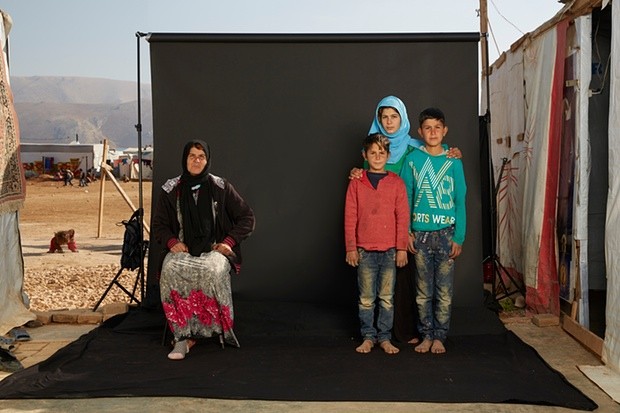
The Guardian
More than anything, war is about families and the effect on them, says Dario Mitidieri. As a photographer, he was commissioned to depict the war in Syria and wanted to show the impact of it on individual families. “These are families like yours and mine,” says Mitidieri, 56, a father of four. “There’s a mother and a father, and there are children. Only for these families – because of war – some of these people are missing.”
He went to a refugee camp in the Bekaa Valley in Lebanon and invited families to pose for formal photographs. It was difficult to find volunteers: many were too afraid, fearing for their missing relatives. No one wanted their full names or the names of the missing to be used. But some families came forward and Mitidieri set to work. “I used the kind of setting that has been used historically all over the world – all the family members are together and look into the camera.”
He had to take chairs with him from Beirut – “There were none like these in the camps to set the scene.”
When the set was built and the subjects were ready, he pulled back to show the full context. “I wanted the place where they were,” he says.
“So behind them you can see the mountains and that is Syria. Alongside them, you can see the tents and that is where they are living.”
Taking a family photograph is usually a happy occasion, but this time it was laced with sadness, says Mitidieri. “People said, how can we be happy when those we love are missing? It felt to them as though it underlined the loss but that was what we were trying to do, to make others aware of what is happening – not only to these families, but to hundreds of thousands of others,” he says.
“What I wanted to do was leave an empty space where the missing person or people should be. It makes you ask the question: who should be there? And where are they now?”
He photographed 10 families and in some cases there was a very high chance the missing person was dead.
“It’s worse for these people that they don’t know where their missing family members are. If they knew they were dead, they could at least grieve.
“They can’t even do that – they are in this kind of no man’s land of hope and agony. I was very struck by the mother whose nine children are missing – she spoke of how it breaks her heart not having them all there, ‘I cry all day thinking of them,’ she said.”
Photography plays a vital part in making the world aware of war. “When you think back over the last few months, the last year, what we hear about the whole time is the migrants, the people who can move right away and come to Europe – who can get away or try to get away across the sea,” he says. “But here in the camps are the people who can’t get away and, as you can see from the pictures, they are mostly the women and the children.
“They are stuck – some have been in these camps for three years. The two camps I visited were supposed to be the better ones, but they were still shocking places to live – so it’s hard to imagine how difficult the conditions must be elsewhere.”
War photography, says Mitidieri, has changed: in 2016 the gruesomeness of war is in overdrive. “These days there are so many terrible images of war – they are ubiquitous and most media outlets won’t show them. But this is the new way in war photography: we’re documenting people’s stories, we’re making it real by telling their stories.”
Mohammed A’s family
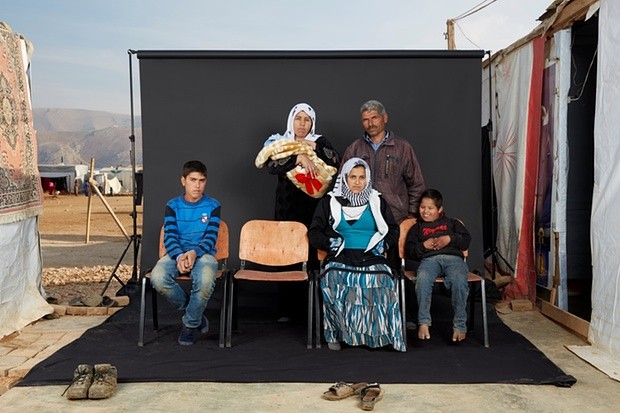
Mohammed’s family was torn apart two years ago, on the day of his daughter’s marriage. The wedding celebration was bombed and the family simply ran: only later did they realise that they had left their newly-wed daughter behind. They left Syria and made a dangerous journey by road, avoiding armed checkpoints, and are now in the Bekaa Valley.
There has been no news, says Mohammed, 45. “We have heard nothing since her wedding night,” he says. “If I saw her today I would ask her how she has been. What she has been doing, and what is going on in her life?”
Souraya’s family
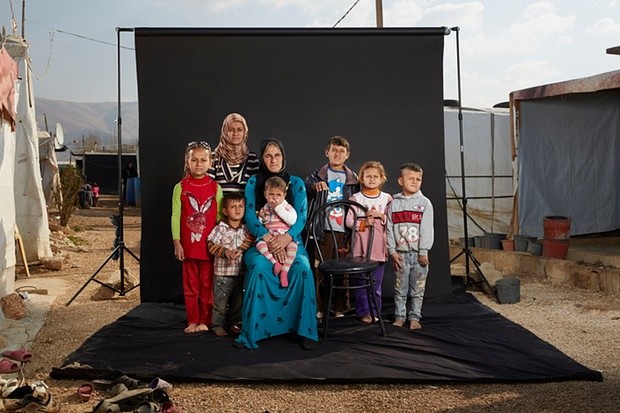
Two years ago, Souraya’s husband told her to take their seven children and flee toLebanon for safety: where they lived had grown too dangerous – they needed to get out.
Souraya, 34, left, but her husband stayed to look after their home and to find work so he could save to get himself to the camp. Five months ago, he had finally saved enough money to join them but, on the way, a missile hit the bus and he was seriously injured. He is still in hospital in Lebanon, but because of the children and lack of money, Souraya can’t go to see him.
They do manage to speak sometimes on the phone. “My husband tells me everything will be fine,” she says. “I am not optimistic. Many bones in his body are smashed because of that missile. I want everything back, like in the past: all of us in good health, and happy.”
Sahar’s family
Before the war, says Sahar, 50, she lived “a good life, a simple life”. Widowed, she lived with her 12 children: she looked after them, they looked after her.
Eighteen months ago, she was woken in the night by the sound of airstrikes. She woke the three children who were still with her – some of the others are married with their own families – and fled. Their town under attack, they left on a bus with other Syrian families. She didn’t know where the bus would end up, and thought it was unlikely they would make it out of Syria. “[But] the soldiers saw the scared eyes of the children and they let us pass,” she says.
Since she left, Sahar – who has no mobile phone – has had no news of her other nine children. “It breaks my heart not having all my children here,” she says. “I cry all day thinking of them.”
Mohammed B’s family
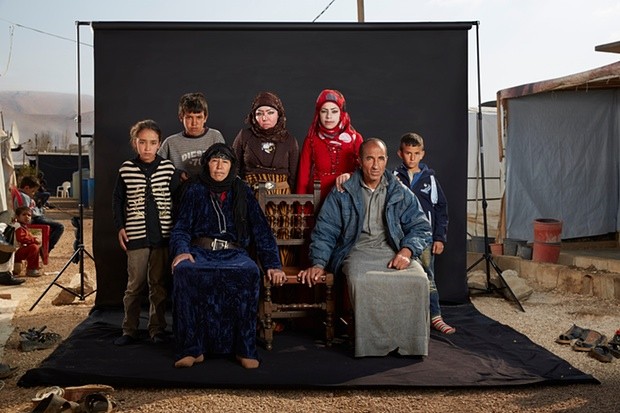
Just over a year ago, Mohammed, 55, and his family were at home when a missile hit their house. His eldest son was badly injured and disappeared in the subsequent chaos.
Mohammed has heard from home that his son is living on the streets, eating only when concerned friends and former neighbours find him and give him food.
The family live on tenterhooks wondering if the next communication about their son will be notification of his death.
Khawle’s family
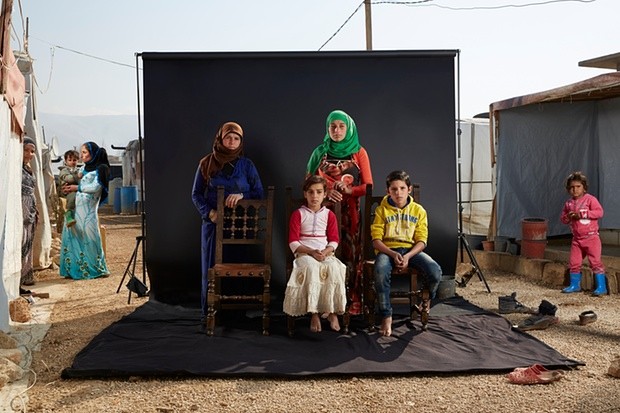
The family arrived in the camp five months ago, having left their grandmother, three brothers and two sisters in Syria.
Khawle, 44, escaped Syria on a bus. When bombing intensified near them, the bus stopped on a mountain and they were told to get out. They tried to make the rest of the journey on foot, but ran into some armed men. They didn’t kill anyone but one of Khawle’s daughters has a learning disability and was beaten so badly that she couldn’t move for days.
They live in the tent now with no electricity and no way to make money.
“Perhaps we might stay like this for the rest of our lives,” says Khawle.
“I don’t have anything to be happy for, just to live like this. I feel sad living here without all my chidren.”
How to submit an Op-Ed: Libyan Express accepts opinion articles on a wide range of topics. Submissions may be sent to oped@libyanexpress.com. Please include ‘Op-Ed’ in the subject line.
- North African leaders to hold summit in Libya - October 21, 2024
- Libyan MP predicts dollar tax reduction to 5% by Year-End - October 21, 2024
- Debate over CNN’s reporting reignited on X by Musk - October 21, 2024


